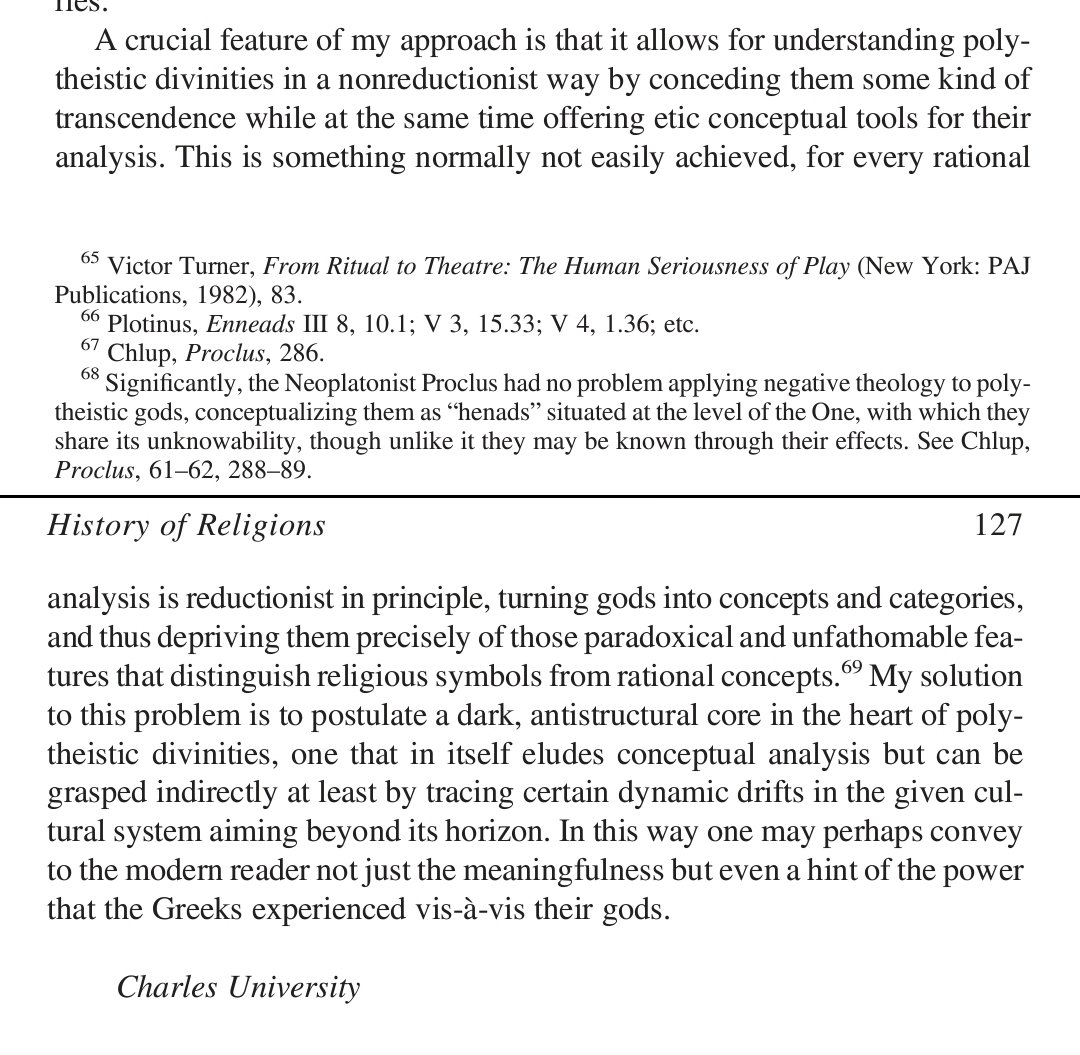I respectfully disagree.
I think this is where one's philosophy of first principles (metaphysics), and what it says Gods are, come in.
If one follows Plato in affirming
1. Gods as always "good".
2. Gods as eternal.
3. Gods are unities (following the Platonic first principle
I think this is where one's philosophy of first principles (metaphysics), and what it says Gods are, come in.
If one follows Plato in affirming
1. Gods as always "good".
2. Gods as eternal.
3. Gods are unities (following the Platonic first principle
https://twitter.com/eldivyn/status/1858391329052434479
...which is unity as such).
...then one cannot reduce Gods to even how they are received. If, as Plato infers from the principle of each thing beyond classification, that Gods are sui generis, then one can receive them today, and this receipt does not have to agree with...
...then one cannot reduce Gods to even how they are received. If, as Plato infers from the principle of each thing beyond classification, that Gods are sui generis, then one can receive them today, and this receipt does not have to agree with...
... previous tradition.
We don't have "higher" knowledge of things that outstrip Gods except you think of Gods as limited entities except according to a logic that is most likely Christian and or generally "monotheist", where one's ontological worth of worship is dictated...
We don't have "higher" knowledge of things that outstrip Gods except you think of Gods as limited entities except according to a logic that is most likely Christian and or generally "monotheist", where one's ontological worth of worship is dictated...
...by ontological place, something that the phenomenology of Polytheism abhors.
The notion of reincarnation, the difference between the character of Gods between myths, the phenomenology of their reception in liturgy, festival, and politics, all of these are consistent...
The notion of reincarnation, the difference between the character of Gods between myths, the phenomenology of their reception in liturgy, festival, and politics, all of these are consistent...
...with Plato's own analysis of what Gods are, and what his Neoplatonic successors said Gods are.
Radek Chlup's analysis of greek polytheism has the virtue of being transposable between different traditions precisely because of this feature of Gods to resist reduction.
Radek Chlup's analysis of greek polytheism has the virtue of being transposable between different traditions precisely because of this feature of Gods to resist reduction.

What I'd recommend for living today with Gods who cannot be reduced to forces, archetypes, or mere limited spirits is to read deep into as many metaphysical traditions as possible.
I am biased towards the Platonic tradition. The purpose is not to make your tradition western, but to develop indigenous philosophies in dialogue with their similars in different places.
As a friend once said, philosophy is inherently transcultural.
As a friend once said, philosophy is inherently transcultural.
In the Platonic tradition (I'm including Aristotle here), we can recognise different levels and types of causation (Aristotle has four.)
The primary cause of things is the cause of their existence, which is equated with unity for Platonists.
Gods "unify", make things "one".
The primary cause of things is the cause of their existence, which is equated with unity for Platonists.
Gods "unify", make things "one".
This is how a God can be the cause of a physical phenomena. Physics does not explain the unity of things. It explains their mechanics. Platonists say Gods existentiates the very contexts and objects that undergo these processes.
This is why Platonists never thought to deny the reality of physics for the reality of Gods. Those are very different ontological levels of causation.
A God associated with lightning existentiates lightning as a physical phenomena and as a symbol. It existentiates the physics.
A God associated with lightning existentiates lightning as a physical phenomena and as a symbol. It existentiates the physics.
You don't need to know theology to study lightning, but when you're doing metaphysics, the nature of existence as such, its possible types, the nature of causation, the viewpoint where physics replaces Gods is woefully inadequate to the objects in question.
End/
End/
• • •
Missing some Tweet in this thread? You can try to
force a refresh




